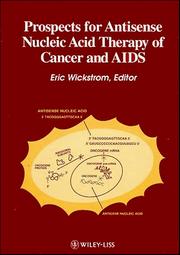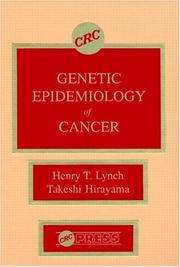| Listing 1 - 10 of 58 | << page >> |
Sort by
|
Book
ISBN: 0471560987 Year: 1991 Publisher: New York Toronto Singapore Wiley-Liss
Abstract | Keywords | Export | Availability | Bookmark
 Loading...
Loading...Choose an application
- Reference Manager
- EndNote
- RefWorks (Direct export to RefWorks)

ISBN: 0471568805 Year: 1991 Publisher: New York Toronto Singapore Wiley-Liss
Abstract | Keywords | Export | Availability | Bookmark
 Loading...
Loading...Choose an application
- Reference Manager
- EndNote
- RefWorks (Direct export to RefWorks)

ISBN: 0849367565 9780849367564 Year: 1989 Publisher: Boca Raton (Fla.): CRC,
Abstract | Keywords | Export | Availability | Bookmark
 Loading...
Loading...Choose an application
- Reference Manager
- EndNote
- RefWorks (Direct export to RefWorks)
Human genetics --- Epidemiology --- Oncology. Neoplasms --- Genetic epidemiology --- Cancer --- Neoplasms --- Genetic aspects --- epidemiology --- genetics --- Cancer - Genetic aspects --- Cancer - Epidemiology --- Neoplasms - epidemiology --- Neoplasms - genetics
Book
ISBN: 3031325737 3031325729 Year: 2023 Publisher: Cham : Springer International Publishing : Imprint: Springer,
Abstract | Keywords | Export | Availability | Bookmark
 Loading...
Loading...Choose an application
- Reference Manager
- EndNote
- RefWorks (Direct export to RefWorks)
Advances in cancer genomics are transforming our understanding of cancer, and have profound implications for its prevention, diagnosis, and treatment. Evolutionary dynamics suggests that as few as two mutations can cause transformation of normal cells into cancer stem cells. A process of Darwinian selection, involving a further three or more mutations, taking place over a period of years, can then result in progression to a life-threatening tumour. In many cases the immune response can recognise and eliminate the mutant cells, but most advanced tumours have mutations that activate immune checkpoints and enable the tumour to hide from the immune system. For the most hard-to-treat tumours, future progress will require molecular diagnostics to detect cancer-causing mutations in healthy subjects, and new drugs or vaccines that prevent the progression process. Chapters of this book deal with the signalling pathways that control cell division, and changes in these pathways in cancer cells. Three cell cycle checkpoints that are often mutated in cancer are analysed in detail. A discussion of chronic myeloid leukaemia illustrates the role of reactive oxygen species in driving progression from a chronic to an acute condition. A single drug that suppresses reactive oxygen can prevent disease progression and turn an otherwise deadly disease into a condition that can be managed to enable many years of normal life. Another chapter discusses chronic myelomonocytic leukaemia, a disease that involves both genetic and epigenetic change. Tumour progression is discussed as a multi-stage process in which cancer stem cells evolve into genetically unstable, invasive, metastatic, drug-resistant growths. Each of these stages can act as targets for drugs or immunomodulators, but the future of cancer treatment lies in understanding tumour dynamics, and arresting malignancy at the earliest possible stage. Evolutionary dynamics is a primarily mathematical technique, but the target readership will be tumour biologists, clinicians, and drug developers. Computational detail is provided in an online supplement, but the main text emphasises the implications of the dynamics for an understanding of tumour biology and does not require mathematical expertise.
Cancer. --- Cancer—Animal models. --- Cancer—Treatment. --- Cancer—Genetic aspects. --- Cancer Biology. --- Cancer Models. --- Cancer Therapy. --- Cancer Genetics and Genomics. --- Cancer Microenvironment. --- Cancers --- Carcinoma --- Malignancy (Cancer) --- Malignant tumors --- Tumors
Book
ISBN: 9780393887662 0393887669 9780393887655 Year: 2023 Publisher: New York : W.W. Norton,
Abstract | Keywords | Export | Availability | Bookmark
 Loading...
Loading...Choose an application
- Reference Manager
- EndNote
- RefWorks (Direct export to RefWorks)
Cancer - Genetic aspects. --- Cancer - Molecular aspects. --- Cancer cells. --- Cancer --- Genetic aspects. --- Molecular aspects. --- Cellules cancéreuses --- Aspect moléculaire --- Aspect génétique
Multi
ISBN: 9783031325731 9783031325724 9783031325748 9783031325755 3031325737 Year: 2023 Publisher: Cham : Springer International Publishing : Imprint: Springer,
Abstract | Keywords | Export | Availability | Bookmark
 Loading...
Loading...Choose an application
- Reference Manager
- EndNote
- RefWorks (Direct export to RefWorks)
Advances in cancer genomics are transforming our understanding of cancer, and have profound implications for its prevention, diagnosis, and treatment. Evolutionary dynamics suggests that as few as two mutations can cause transformation of normal cells into cancer stem cells. A process of Darwinian selection, involving a further three or more mutations, taking place over a period of years, can then result in progression to a life-threatening tumour. In many cases the immune response can recognise and eliminate the mutant cells, but most advanced tumours have mutations that activate immune checkpoints and enable the tumour to hide from the immune system. For the most hard-to-treat tumours, future progress will require molecular diagnostics to detect cancer-causing mutations in healthy subjects, and new drugs or vaccines that prevent the progression process. Chapters of this book deal with the signalling pathways that control cell division, and changes in these pathways in cancer cells. Three cell cycle checkpoints that are often mutated in cancer are analysed in detail. A discussion of chronic myeloid leukaemia illustrates the role of reactive oxygen species in driving progression from a chronic to an acute condition. A single drug that suppresses reactive oxygen can prevent disease progression and turn an otherwise deadly disease into a condition that can be managed to enable many years of normal life. Another chapter discusses chronic myelomonocytic leukaemia, a disease that involves both genetic and epigenetic change. Tumour progression is discussed as a multi-stage process in which cancer stem cells evolve into genetically unstable, invasive, metastatic, drug-resistant growths. Each of these stages can act as targets for drugs or immunomodulators, but the future of cancer treatment lies in understanding tumour dynamics, and arresting malignancy at the earliest possible stage. Evolutionary dynamics is a primarily mathematical technique, but the target readership will be tumour biologists, clinicians, and drug developers. Computational detail is provided in an online supplement, but the main text emphasises the implications of the dynamics for an understanding of tumour biology and does not require mathematical expertise.
Oncology. Neoplasms --- oncologie --- Cancer. --- Cancer—Animal models. --- Cancer—Treatment. --- Cancer—Genetic aspects. --- Cancer Biology. --- Cancer Models. --- Cancer Therapy. --- Cancer Genetics and Genomics. --- Cancer Microenvironment.
Book
ISBN: 0124165907 0124165702 1299774547 9780124165908 9780124165700 9780124165700 Year: 2013 Publisher: Amsterdam Elsevier
Abstract | Keywords | Export | Availability | Bookmark
 Loading...
Loading...Choose an application
- Reference Manager
- EndNote
- RefWorks (Direct export to RefWorks)
Currently, intensive effort is being directed toward the identification of molecular targets that can provide approaches to the development of novel therapeutic strategies in cancer management. This book focuses on metastasis-associated genes, metastasis promoter and suppressor genes, which relate specifically to behavioral alterations of cancer cells in epithelial mesenchymal transition, cancer stem cell maintenance and propagation, and to the acquisition of invasive and metastasis faculty. The function of these genes has implications for cell cycle regulation and cell proliferation and so
Cancer -- Genetic aspects. --- Cancer -- Molecular aspects. --- Cancer -- Treatment. --- Diseases --- Neoplasms --- Medicine --- Health & Biological Sciences --- Oncology --- Cancer --- Molecular aspects. --- Genetic aspects. --- Treatment. --- Cancer therapy --- Cancer treatment --- Cancer genetics --- Cancer genes --- Therapy
Book
ISBN: 9789811989117 Year: 2023 Publisher: Singapore Springer Nature Singapore :Imprint: Springer
Abstract | Keywords | Export | Availability | Bookmark
 Loading...
Loading...Choose an application
- Reference Manager
- EndNote
- RefWorks (Direct export to RefWorks)
This book highlights the interrelation between cell cycle regulators and breast cancer phenotypes. It reviews the roles of Cyclin-Dependent Kinases (CDK) in driving cell cycle progression, cell cycle checkpoints and dysregulation in breast cancer. It also examines the prognostic significance of CDKs in breast cancer. and CDK inhibitors for the treatment of metastatic breast cancer. Further, the book discusses the role of different G1 cyclins in differentiation, chromosome stability, and transcriptional regulation in breast cancer. Additionally, it examines the role of immunogenic effects of CDK inhibitors, the mechanism of resistance and the current clinical trials in breast cancer treatment. Towards the end, the book explores cell cycle regulation as an attractive target for targeted drug therapy in breast cancer. This book is a comprehensive yet concise resource for oncologists and researchers interested in exploring the therapeutic potential of Cyclin-Dependent Kinases in breast cancer.
Cancer. --- Cancer—Treatment. --- Cancer—Genetic aspects. --- Cancers. --- Cancer Therapy. --- Cancer Genetics and Genomics. --- Cancers --- Carcinoma --- Malignancy (Cancer) --- Malignant tumors --- Tumors --- Breast --- Cell cycle. --- Cancer --- Treatment. --- Mitotic cycle --- Nuclear cycle (Cytology) --- Biological rhythms
Book
ISBN: 3540692967 9786611913830 1281913839 3540692975 Year: 2009 Publisher: Berlin ; London : Springer,
Abstract | Keywords | Export | Availability | Bookmark
 Loading...
Loading...Choose an application
- Reference Manager
- EndNote
- RefWorks (Direct export to RefWorks)
More than 180 participants and experts from 31 countries met for the fifth time in 10 years in St. Gallen, Switzerland for a 3-day conference to discuss important current issues of clinical cancer prevention. The meeting was again organized and co-sponsored by St. Gallen Oncology Conferences (SONK). While SONK has been extremely successful in organizing large international c- gresses on “Primary Therapy of Early Breast Cancer” as well as “Supportive Care in Cancer” for more than 20 years, the idea of promoting interdisciplinary, clinically oriented meetings on cancer prevention is a more recent and not yet generally accepted and w- comed concept in modern oncology. Since today’s medical expenses are soaring and me- cal research budgets are stagnating or even being cut, neither politicians nor industry is willing to risk an additional unpredictable channel of expenses, such as that demanded by clinical cancer prevention efforts! In Switzerland—and we fear in many other parts of the globe—some 97%–98% or even a greater percentage of health budgets is spent for curative and palliative/rehabilitative m- icine. Since a meager 2%–3% of national health budgets is for preventive medicine, even less than that proportion is specifically allocated for cancer prevention. When the money for “curing and caring” for the diseased populace runs short, there is likely not much left for partly controversial disease prevention in the (still) healthy part of the population.
Cancer -- Genetic aspects -- Congresses. --- Cancer -- Genetic aspects. --- Cancer -- Prevention -- Congresses. --- Cancer -- Prevention. --- Chemoprevention -- Congresses. --- Neoplasms -- genetics -- Congresses. --- Cancer --- Biology --- Diseases --- Drug Therapy --- Publication Formats --- Therapeutics --- Biological Science Disciplines --- Publication Characteristics --- Natural Science Disciplines --- Analytical, Diagnostic and Therapeutic Techniques and Equipment --- Disciplines and Occupations --- Genetics --- Congresses --- Chemoprevention --- Neoplasms --- Medicine --- Health & Biological Sciences --- Oncology --- Prevention --- Genetic aspects --- Medicine. --- Cancer research. --- Oncology. --- Medicine & Public Health. --- Cancer Research. --- Tumors --- Cancer research --- Clinical sciences --- Medical profession --- Human biology --- Life sciences --- Medical sciences --- Pathology --- Physicians

ISBN: 0720406269 0720406250 9780720406252 9780720406269 Year: 1977 Publisher: Amsterdam: North-Holland,
Abstract | Keywords | Export | Availability | Bookmark
 Loading...
Loading...Choose an application
- Reference Manager
- EndNote
- RefWorks (Direct export to RefWorks)
Molecular biology --- Mammals --- Molecular genetics --- Cancer --- Aging --- Congresses --- Genetic aspects --- Congresses. --- Génétique moléculaire --- Mammifères --- Vieillissement --- Aspect génétique --- Génétique moléculaire. --- Molecular genetics. --- Génétique moléculaire. --- Aspect génétique. --- Molecular genetics - Congresses --- Mammals - Molecular genetics - Congresses --- Cancer - Genetic aspects - Congresses --- Aging - Genetic aspects - Congresses --- Mammifères
| Listing 1 - 10 of 58 | << page >> |
Sort by
|

 Search
Search Feedback
Feedback About UniCat
About UniCat  Help
Help News
News